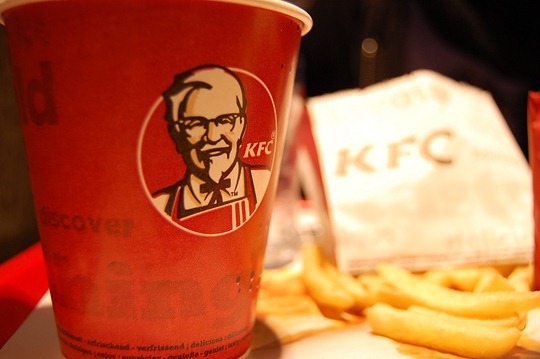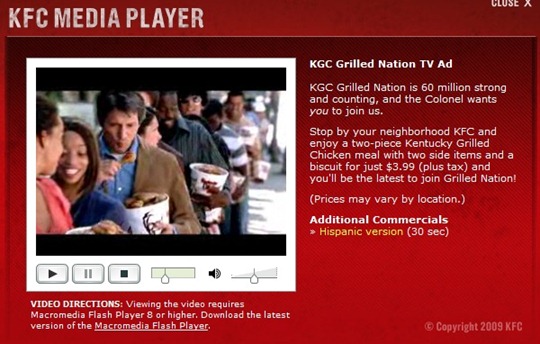Photo ‘KFC, Paris’ by sophiexphotography / Flickr
KFC’s recent marketing campaign highlights a significant issue in our fast-food society: unnecessary waste.
The latest commercial starts out with a black man with a white background holding a bucket of chicken where he nods to the camera and gleefully declares, “I’m in”. More people quickly join this man while holding their own buckets of chicken, stating: “We’re in too”, and “I’m a part of it” – as if eating at KFC is akin to belonging to some sort of secret society.
A few seconds later there are dozens, then thousands, then millions of people lined up to declare their own affiliation with the secret KFC society.
The purpose of this commercial is to highlight the fact that more than 60 million people have eaten the all new Kentucky “grilled” chicken that KFC launched back in April 2009 when health-conscious Americans finally generated enough demand for KFC to offer a health(ier) alternative to deep fried chicken.
They are calling the latest marketing campaign “grilled nation”, and there is even evidence of a gradual shift from KFC to being known as KGC. It doesn’t quite have the same ring, but perhaps after years of repetition we will become more accustomed to it.
It’s possible I see things differently than most people, but when I see millions of people standing in an endless line – each carrying their own bucket of chicken – all I can think about is the amount of unnecessary waste generated by KFC and other fast food chains.
A major root cause of the damage we are causing to the planet is laziness. We are too lazy to cook so we eat fast food; we are too lazy to walk or bike so we drive everywhere; we are too lazy to carry food containers or coffee mugs, so we use disposable cups and food packaging.
I can’t blame KFC for basking in such a radical extension to a core menu that hasn’t changed a whole lot over their 50+ years of operations. A KFC grilled chicken breast only has 4 grams of fat compared to 21 grams of fat in the Colonel’s original deep fried recipe – so there are substantial health benefits to the new recipe.
But what we really need is a radical change to how we handle fast food waste, and the first fast food chain who is progressive on reducing its waste will win the hearts and minds of eco-conscious individuals – a core value that is spreading to more people each day.
There are several ways that a fast food chain can actively reduce its waste footprint. One option would be to offer dine-in plates, cups and cutlery with on-premises dish washing. If only half of KFC’s 12 million daily customers were served on re-usable plates, it would cut their customer waste generation immediately in half.
Another revolutionary (yet simple) idea would be to offer discounts for customers who bring their own re-usable containers. Furthermore, they could sell re-usable eco-friendly containers to customers who don’t bring their own. This could accommodate the other half of those 12 million daily customers.
Lastly, I suggested earlier this year that fast-food chains could use fallen leaves as sustainable food packaging as an alternative to paper or plastic.
KFC has proven that a fast-food restaurant can evolve to offer more health-friendly options for those health-conscious individuals. Perhaps we could take a similar approach to accommodate eco-conscious individuals. When enough of us care, fast-food restaurants will have to choose whether they want to evolve or die.
When that day arrives, I just may decide to try KFC again.
James D. Schwartz is the editor of The Urban Country and appears on most Sundays and Thursdays, and sometimes in between. View all of James’ articles here.




I like the idea, and I don’t mean to be discouraging, but one of your solutions (having customers bring in their own reusable containers) wouldn’t work. It is a health code violation.
There’s a good reason for it really, too. If you get take out at a restaurant and get sick, and then it is found that what got you sick was in the container, they can’t say if it’s the restaurants fault or not because you brought the container in.
Also, bringing all these containers into the restaurants kitchen introduces a lot more opportunity for the kitchen to become contaminated.
I like the other ideas, however.
That is true Jennifer – but there are ways around this. They could line the container with a thin sheet of paper – similar to what McDonalds gives you with your eat-in tray. This would still have the effect of eliminating at least 90% of the current level of waste and would ensure proper hygiene.
Think about how many paper and plastic bags that are wasted at a fast-food restaurant just to transport burgers that are already individually wrapped anyway.
Hi,
It’s amazing how much waste is generated by the fast food industry.
I just wanted to let you know about a compostable products package we put together for green office meetings, conferences, holiday parties and other events where food and beverages are served.
A cost effective, convenient way to green your next event.
Details: http://www.gogreeninstages.com/CompostableStore/compostable-tableware-kit.php
Press Release: http://www.gogreeninstages.com/press-information/Compostable-Tableware-Kit-Press-Release.pdf
If you are interested in more information please contact us.
Best Regards,
Julia
i saw a commercial for the commercial you’re refering to and i want to use it for a school project (propaganda bandwagon example) got any links to it?